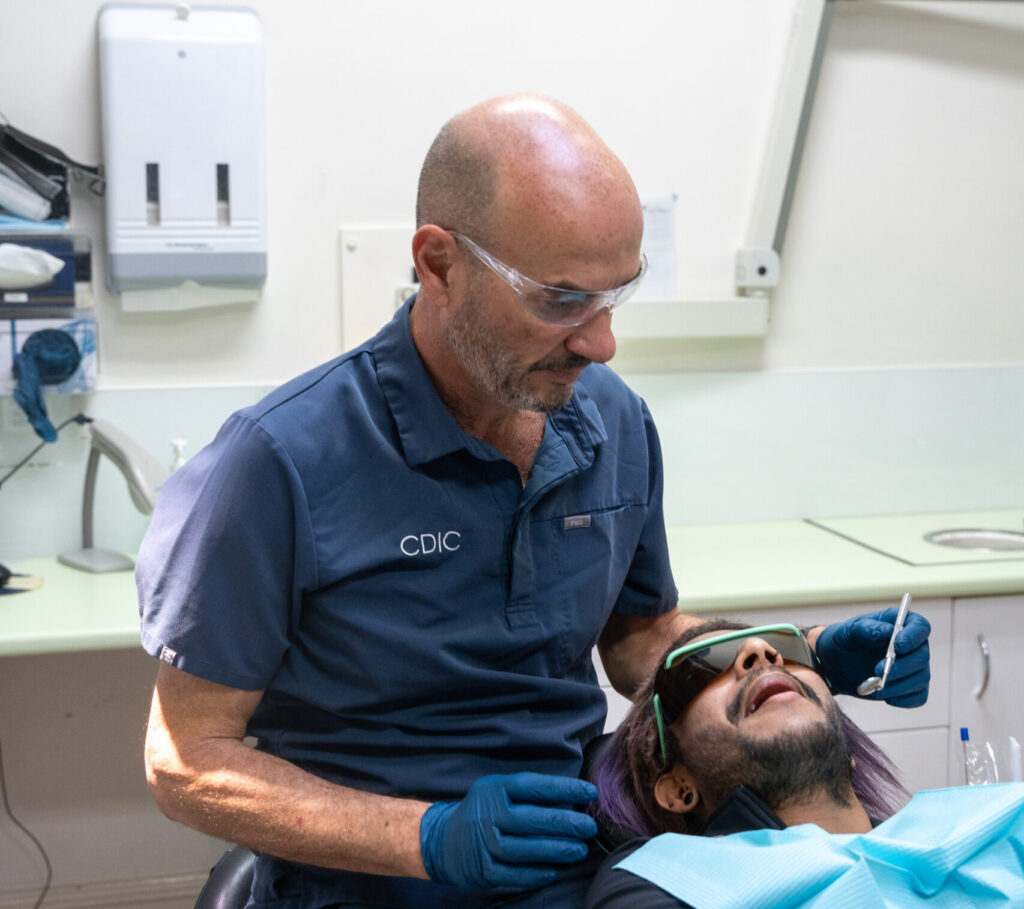Wisdom teeth don’t always erupt properly into the mouth. When this happens, they are described as impacted. With careful and safe removal, painful problems related to the impacted teeth can be avoided.

Wisdom teeth — actually our ‘third molars’ — are typically the last teeth to come through in your mouth, erupting furthest back usually in the teenage years or early 20s. Normally, there are two upper and two lower wisdom teeth in each mouth, but that number can vary from person to person, and some are lucky to have none.
Unfortunately, wisdom teeth often do not emerge properly, coming through at an angle and pushing into surrounding teeth or gums, while others develop in the jaw but never come through the gum. This is known as impaction, and it can lead to pain, wisdom tooth infection and tooth decay that sometimes affects adjacent teeth. Other reasons for removal include gum infection/abscess, cysts, pressure on other teeth causing movement and bite changes, jaw bone loss and as directed in orthodontic treatments.


Common symptoms of impacted wisdom teeth include swollen, tender and bleeding gums, bad breath or an unpleasant mouth taste, jaw discomfort and stiffness, and difficulty opening the mouth. The only way to know for sure is to have an x-ray where we thoroughly check your jawbone and teeth, and identify if you have wisdom teeth that have not come through or are coming through incorrectly.
Unfortunately, it is not possible to prevent wisdom teeth from impacting, but at CDIC we offer teenagers and young adults wisdom teeth x-ray and screening to identify whether removing them as a preventive measure is justified and worthwhile. Early treatment can reduce the risk of any problems that may occur and also reduce the risk of complications associated with their removal.
We begin by assessing your teeth and jaw through an x-ray, looking especially at the position and angle of your wisdom teeth. This helps to determine how complex an extraction would be. Because potential complications from extractions increase with age, we recommend having your wisdom teeth assessed before the age of 26.
We make an incision in the gum to expose the wisdom tooth and surrounding bone, before dividing the tooth into multiple sections for easier removal. Once all pieces of the tooth are removed, we thoroughly clean the site, and a dissolving stitch is placed to close the gum.
Most wisdom teeth can be safely removed under local anaesthetic and occasionally oral sedation, but you may need to go under general anaesthetic for more complex removals.
Following your extraction, it’s normal to experience some swelling, bruising, and a little bleeding. Pain can generally be managed with over-the-counter medication, and your dentist will advise you to eat soft foods and rest for the first few days following the removals. We provide detailed aftercare instructions to support your healing and minimise the risk of infection and other complications
Removing impacted or potentially problematic wisdom teeth can reduce infections related pain and avoid other future issues. For a planned or emergency wisdom tooth removal, you are always in safe hands at CDIC.
We welcome all new patients from across Melbourne looking for the highest standard of care. Book a wisdom teeth screening today to learn more and get ahead of any potential complications.

As CDIC’s leading Dental Surgeon, Dr Hillel New has been providing exceptional dental care for over 34 years, building a reputation for providing quality, pain-free treatments in cosmetic and implant dentistry. Dr New’s expertise sees him regularly called on to identify and troubleshoot problems many people experience with their dental treatments.
His treatment philosophy centres around a commitment to evidence-based dentistry, and he believes in effective communication as the key to treatment success and long-term relationships with his patients.
With over three decades of experience, Dr New has seen it all and is passionate about coming up with the perfect solution for every patient. Here are just a few of the happy smiles he’s helped create.
Check out our range of teeth replacement options.
The cost of wisdom teeth removal can vary based on several factors, including the number of teeth being removed, the complexity of the procedure, and whether the procedure is performed under local or general anesthesia. At CDIC, our wisdom tooth extractions typically range between $265 and $690.
Not everyone needs to have all of their wisdom teeth removed. The decision depends on factors such as the position of the teeth, their potential to cause problems, and your overall oral and systemic health. Some people may have enough space in their mouths for their wisdom teeth to grow properly, while others may require removal to prevent complications.
After wisdom teeth removal, you can expect some swelling, bruising, discomfort, and minimal bleeding for the first few days. Pain management can typically be handled with over-the-counter medications or prescription pain medication from your dentist. It’s normal to experience bruising and stiffness in your jaw as well. Your dentist will provide aftercare instructions, including how to care for the extraction sites and when to follow up.
After wisdom teeth extraction, it’s important to stick to soft foods to avoid irritating the gum around the extraction sites. Suitable options include yoghurt, smoothies, mashed potatoes, and soft-cooked pasta. Avoid hot, spicy, or crunchy foods, as well as anything that requires hard chewing for the first few days. Staying hydrated is essential, but avoid using straws, as the suction can dislodge blood clots.
While you can’t prevent wisdom teeth impaction, regular dental check-ups can help monitor their development. Your dentist can assess their position with special x-rays and recommend early removal if they are likely to become impacted and cause problems. Maintaining good oral hygiene and being aware of any discomfort can also help catch issues early before they lead to more serious problems.
Mon: 8.30 – 17.30
Tue: 8.30 – 17.30
Wed: 8.30 – 17.30
Thu: 8.30 – 17:30
Fri: 8.30 – 17:00
Sat: closed
Sun: closed
© 2025 CDIC | Disclaimer | CCTV Policy| Privacy Policy
Website developed by Media Exchange